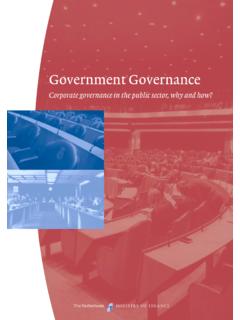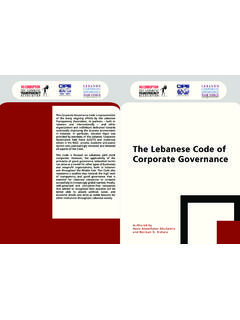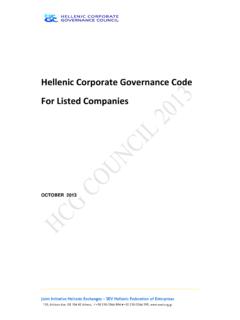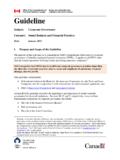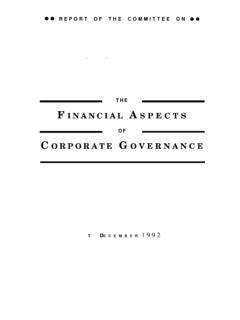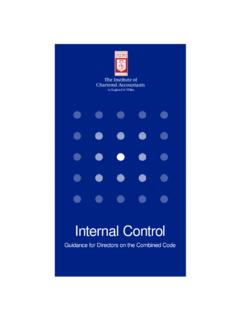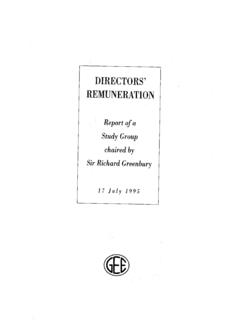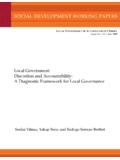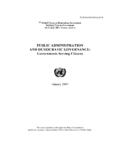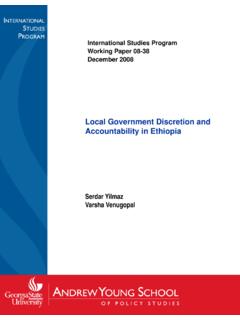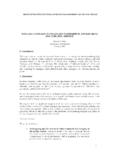Transcription of Corporate governance in central government …
1 Corporate governance incentral governmentdepartments:Code of good practiceJuly 2005 Corporate governance incentral governmentdepartments:Code of good practiceJuly 2005 Crown copyright 2005 Published with the permission of HM Treasury on behalf of the Controller of Her Majesty s Stationery Office. The text in this document (excluding the Royal Coat of Arms and departmental logos) may be reproduced free of charge in any format or medium providing that it is reproduced accurately and not used in a misleading context. The material must be acknowledged as Crown copyright and the title of the document specified. Any enquiries relating to the copyright in this document should be sent to: The Licensing Division HMSO St Clements House 2-16 Colegate Norwich NR3 1BQ Fax: 01603 723000 E-mail: HM Treasury contacts This document can be accessed from the Treasury Internet site at: For further information on the Treasury and its work, contact: Correspondence and Enquiry Unit HM Treasury 1 Horse Guards Road London SW1A 2HQ Tel: 020 7270 4558 Fax: 020 7270 4861 E-mail: This code of good practice for Corporate governance in central government departments is issued by the Treasury.
2 It was drawn up under the oversight of a steering group chaired by Professor Sir Andrew Likierman. The Treasury is grateful for the assistance of the members of the group, who were: Lynton Barker Chief Executive, Hedra plc Sir Brian Bender Permanent Secretary, department for Environment, Food and Rural Affairs Tim Burr Deputy Comptroller and Auditor General, NAO Sir Nigel Crisp Permanent Secretary, department of Health and Chief Executive of National Health Service Geoff Dart Non Executive Board Member, Ministry of Defence Steve Freer Chief Executive, CIPFA Alice Perkins Director General, Cabinet Office David Richards Finance Director, National Assembly for Wales John Smith Finance Director, BBC Sir Robert Smith Chairman, Weir plc Corporate governance code for central government departments1 CONTENTS PageChapter 0 Introduction 3 Chapter 1 Parliamentary accountability 5 Chapter 2 The board 7 Chapter 3 Skills 9 Chapter 4 Independent non-executives 11 Chapter 5 Internal controls 13 Chapter 6 Arm's length bodies 15 Annex A Developing the Corporate governance agenda in central government 17 Corporate governance code for central government departments3 The role of Corporate governance i.
3 Corporate governance is the way in which organisations are directed and controlled. It defines the distribution of rights and responsibilities among the different stakeholders and participants in the organisation, determines the rules and procedures for making decisions on Corporate affairs including the process through which the organisation s objectives are set, and provides the means of attaining those objectives and monitoring performance. ii. There is already a great deal of guidance on a variety of aspects of Corporate governance , for example in government Accounting, the Ministerial Code, the Civil Service Code and the Cabinet Office Toolkit for Boards. But none provides an overview of the processes and responsibilities within departments. This code is intended to fill that gap. About this code iii. Much of the content of the code will be familiar to those working in or with central government .
4 In particular, nothing in the code is intended to disturb the existing roles and responsibilities of ministers. Ministers lead departments and are responsible for and accountable to Parliament for the actions and policies of their departments. Boards are there to support Ministers in the leadership and running of departments. The material on the operation of boards and the role of non-executive members is largely new, reflecting an agenda which has developed rapidly in recent years and will continue to do so. iv. The code has been assembled to guide central government departments, focussing on the role of departmental management boards and how they can support ministers and heads of departments. It does not spell out in detail how departments should approach every aspect of their governance since it is more appropriate for them to make pragmatic decisions against a principled framework to suit their own responsibilities and circumstances.
5 In particular, the code is not intended to cut across any legal obligations or constitutional requirements of departments, nor the special position of the devolved administrations. Some provisions are also different for non-ministerial departments. v. The principles and techniques outlined in the code will also prove useful for other parts of central government , other central government bodies and lower tiers of control and management, and in executive agencies. In these cases the code should be applied with adjustments to suit their scale, responsibilities and accountability chains. vi. The code is guidance on good practice, building on existing constitutional and statutory practice. Departments should apply its principles flexibly in the context of their own circumstances. As set out in the code (provisions , , and ), the board of each department should give a clear account of how far it has complied with key aspects of the code, including an explanation of why any alternative approaches have been chosen, such as, overriding legal constraints.
6 This report on the department s Corporate governance should form 0 INTRODUCTION 0 INTRODUCTION 4 Corporate governance code for central government departments part of the material accompanying its annual resource accounts. Much of this material is already covered in departments publications. Looking ahead vii. The code is intended to be a living document. It will evolve as practice develops, with the first set of adjustments likely to cover: lessons from the financial management reviews which follow the 2004 Spending Review; the implications of the efficiency agenda in the 2004 Gershon report; the approach to professional skills in the civil service, launched in October 2004. viii. Looking further ahead, there could be scope for more radical developments in Corporate governance practice and in the code. In the meantime departments should consider experimenting with alternative approaches, which could provide useful pointers to future changes to the code.
7 A note on some possible developments is annexed. ix. The most up to date version of the code will be kept electronically on the Treasury s website, Corporate governance code for central government departments5 PRINCIPLES 1A. The minister in charge of the department is responsible and answerable to Parliament for the exercise of the powers on which the administration of that department depends. He or she has a duty to Parliament to account, and to be held to account, for all the policies, decisions and actions of the department including its executive agencies. 1B. Under the minister, the head of the department , as its Accounting Officer, is also personally responsible and accountable to Parliament for the management and organisation of the department , including the use of public money and the stewardship of its assets. Supporting provisions The minister in charge of the department may devolve to his or her junior ministers responsibility for a defined range of departmental work, including Parliamentary business.
8 When ministers devolve such responsibility to other ministers, that delegation should be made in writing. In non-ministerial departments, there should be a documented agreement as to which minister(s) should answer for the department s affairs in Parliament, depending on the matter in question. Non-ministerial departments may also be bound by their own specific legislation. Where a minister delegates authority to departmental officials or to officials in any agency through which the department operates, there should be a clear definition in writing of the delegation of those responsibilities. Where ministers delegate powers to officials, the decisions taken using these powers remain decisions for which ministers are accountable to Parliament. The official at the head of the department is normally appointed as its Accounting Officer (AO). The Accounting Officer should establish and document a clear allocation of responsibilities amongst officials in the department , but he or she retains personal responsibility and accountability to Parliament for: propriety and regularity; prudent and economical administration; avoidance of waste and extravagance; efficient and effective use of available resources; and the organisation, staffing and management of the department .
9 1 PARLIAMENTARY ACCOUNTABILITY 1 PARLIAMENTARY ACCOUNTABILITY 6 Corporate governance code for central government departments The Accounting Officer is also responsible to Parliament, in respect of the deployment of public money, to consider value for money from the point of view of the wider Exchequer. At the request of the departmental Accounting Officer, other senior officials in the department may be appointed as Additional Accounting Officers for certain accounts, Requests for Resources (RfRs), or distinct parts of an Estimate. It is best practice for at least one Additional Accounting Officer to be appointed in larger departments. However, the departmental Accounting Officer retains overall responsibility to Parliament for ensuring a high standard of financial management in the department as a whole. Corporate governance code for central government departments7 PRINCIPLE 2.
10 Each department should be managed by an effective board which, within the strategic framework set by the minister (or, in the case of a non-ministerial department , by legislation), supports the head of the department by advising ministers and taking ownership of the department s performance. Supporting provisions Chaired by, under the direction of or with the agreement of the minister, and consistent with the requirements of , the board should collectively provide leadership in the department and: take forward the department s agreed strategic aims and objectives; advise on the allocation of its financial and human resources to achieve those aims; manage departmental resources, monitoring the achievement of performance objectives; set the department s standards and values; maintain a transparent system of prudent and effective controls (including internal controls); assess and manage risk; and lead and oversee the process of change, encouraging innovation, and where appropriate enterprise, to enhance the department s capacity to deliver.
